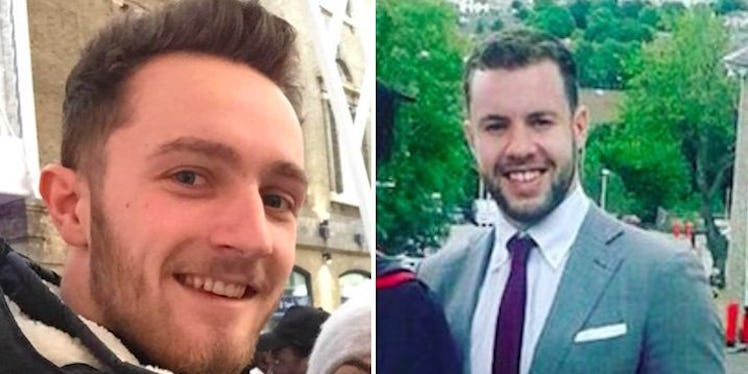Coffee and Red Bull are staples in every college student's diet.
However, two students nearly died after accidentally overdosing on enough caffeine for 300 cups of coffee in a university science experiment gone horribly wrong.
Alex Rossetto and Luke Parkin, who were studying sports science at Northumbria University, volunteered to participate in a study that looked to uncover the effects of caffeine on exercise.
However, a mathematical error resulted in the two 20-year-old students receiving a caffeine dosage that was 100 times greater than what they should have taken.
Within minutes of consuming the caffeine, both Rossetto and Parkin experienced violent side-effects from the overdose and were admitted to a hospital with "life- threatening reactions."
According to court records, the two students suffered dizziness, shaking, blurred vision, rapid heart rates and vomiting as a result of the University's "Wingate Test."
During a hearing at Newcastle Crown Court, prosecutor Adam Farrer told the court the students should have been given 0.3 grams of caffeine, instead of the 30 grams administered in the study.
He put the dangerous caffeine dosage into perspective for the court, stating that the average cup of coffee has about 0.1 grams of caffeine, thus making the dosage given to the students equivalent to 300 cups of coffee.
The botched university experiment caused Rossetto and Parkin to be placed in the intensive care unit and receive dialysis.
According to Farrer, "It would be mixed with water and orange juice, but they were erroneously given 30.7 grams and 32 grams of caffeine, which was 100 times the dosage they should have been given."
Farrer told the courts that the high dosage left the students in a "life-threatening condition."
He revealed other people have died from consuming 18 grams of the drug — let alone 30 grams — meaning the dose administered to the students could have easily been fatal.
During the hearing, Judge Edward Bindloss pointed out the students were in good physical shape at the time, which could have helped their bodies cope with the massive overdose.
According to Judge Bindloss, "It was known excess caffeine was potentially fatal, it should have had high priority, risk assessments should have been carried out and appropriate checks put into place and appropriate training given."
As a result of the incident, Northumbria University was fined $504,400 and ordered to pay $33,400 plus a $150 victim surcharge.
Apparently, the University had recently switched from using caffeine tablets to caffeine in powder form prior to the incident which, according to the prosecutor, meant there should have been extra supervision in regards to calculating the doses.
Farrer pointed out, "It was clearly quite an amount of powder."
He told the court, "During the preparation of the caffeine by the students, the calculations had been incorrectly made. The staff were not experienced or competent enough and they had never done it on their own before. The University took no steps to make sure the staff knew how to do it."
Apparently, students had used their cell phones to do the caffeine dosage calculations, placed the decimal point in the wrong spot and conducted no-risk assessment for the experiment, which resulted in a major miscalculation.
If that's not bad enough, a doctor at the University even lectured the students about the dangers of caffeine overdoses earlier that morning.
According to Farrer, "The failures to follow basic health and safety requirements were cumulative, persistent, long-standing and systemic. The University failed in its duty to ensure the safety of its students."
Rossetto was hospitalized for six days, during which he lost 26.5 pounds, and suffered short-term memory loss. Parkin spent two days in the hospital and lost a total of 22 pounds as a result of the overdose.
Luckily, both students have managed to make a full physical recovery.
Last month, the University admitted to the health and safety violations during a hearing. Peter Smith, of the defense, said Vice Chancellor Andrew Wathey and other staff members attended the hearing.
Smith spoke on behalf of the University's officials, stating, "They are deeply sorry, genuinely sorry, for the breach in this case. The University community is a close one and they wish to emphasize that they take the welfare of their students and staff seriously."
The case is still ongoing, and Judge Edward Bindloss is expected to make a decision later on afternoon of January 25.
Citations: Students left fighting for life after taking equivalent of 300 cups of coffee in botched experiment (Chronicle Live)
